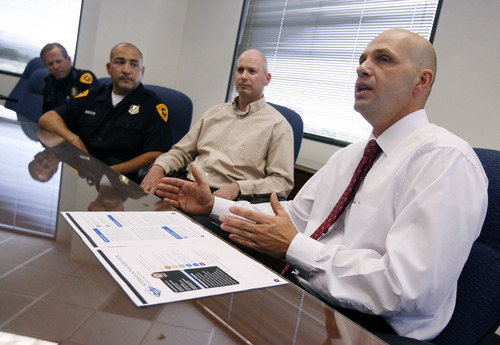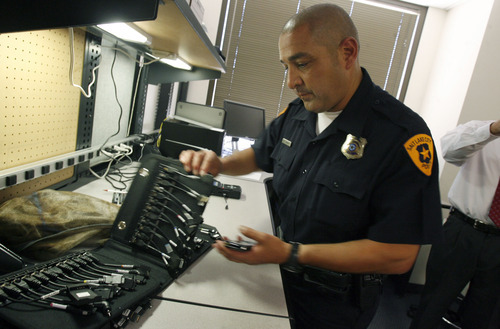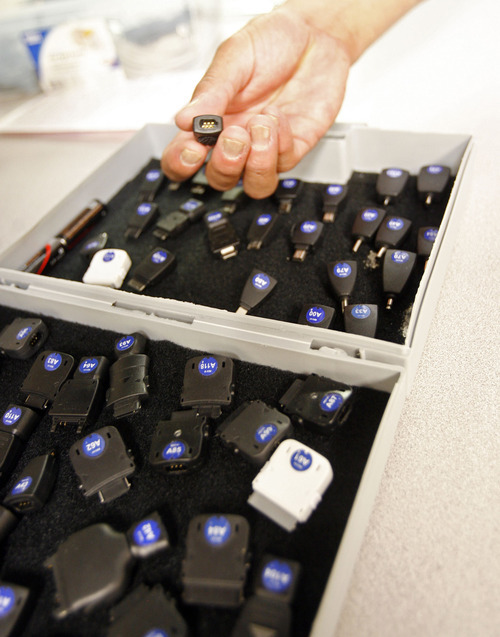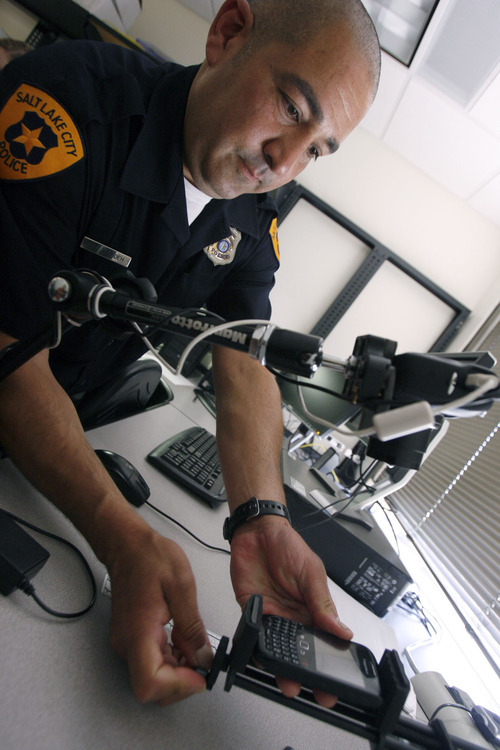This is an archived article that was published on sltrib.com in 2011, and information in the article may be outdated. It is provided only for personal research purposes and may not be reprinted.
Salt Lake City prosecutors knew a component of convicting two men charged with severely beating a 17-year-old with a battle ax outside a Kearns home was proving the attackers lured their victim outside by posing as a girl sending text messages.
But they needed to see exactly what texts were sent and whose phone those messages came from.
Records extracted from cellphones confiscated after the arrests of Cody Jesse Augustine, 23, and Scott Tyler Stapley, 24, in 2008 showed that the men pretended to be a girl the victim had previously dated and promised sex if he came outside the home in the early morning hours to meet her.
The jurors who convicted Augustine and Stapley of first-degree felony attempted murder saw a transcript of the texts, helping prosecutors prove the men had planned their attack.
In an age when more crime is committed with social media, the Internet, cellphones and cameras as witnesses, digital evidence like that used in the battle-ax case is becoming more important than ever. It's why experts at the FBI's Intermountain West Regional Computer Forensic Laboratory, or RCFL, in Salt Lake City are seeing expanding caseloads and training more police officers on how to analyze cellphones for evidence.
The lab, which serves law enforcement agencies in Utah, Idaho and Montana, assisted 96 police agencies in the past year, said Michael Jensen, director of the Intermountain West RCFL.
"More and more PDs are using this as a resource. There is more awareness of the lab and what we do," he said.
Located in an office building near the Gateway mall, the lab conducted 609 examinations in 2010. Examiners testified in eight court cases and trained 115 officers on digital forensic tools.
Whether it is a phone record proving a suspect was at a crime scene, photos of nude teenagers sent over cellphones in "sexting" cases, or photos on the hard drive of a child pornography distributor, experts at RCFS work on an endless variety of data. The work is a meticulous, sometimes painstaking process that can take days. But finding the right file can be key to making or breaking a case.
After obtaining a search warrant, examiners hunt for potential evidence by using software programs and different operating systems. They search for deleted, encrypted or damaged file information suspects may have tried to destroy.
The laboratory is assisting in two of Utah's recent high-profile cases: The slaying of Ethan Stacy and the search for missing West Valley City mother Susan Powell.
Nathan Sloop, 32, and Stephanie Sloop, 28, are both charged with aggravated murder in the slaying of 4-year-old Ethan Stacy in May 2010. Stephanie Sloop was Ethan's mother, and Nathan Sloop was his new stepfather. Charging documents allege the couple engaged in multiple acts of "severe abuse" between April 29 and May 8, which led to Ethan's death, including "beatings, burning, drugging, isolating, malnourishing, leaving the child alone and unattended while suffering, and refusing to seek vital life-sustaining medical attention."
The case is set for a preliminary hearing in November — where evidence retrieved from hard drives and phones by forensic examiners at the RCFL could be presented.
RCFL examiners have also helped in Powell's case.
The 29-year-old disappeared Dec. 7, 2009, from her West Valley City home. Her husband, Josh Powell, has said he took his young sons on a late-night camping trip to Simpson Springs in Tooele County and when he returned his wife was gone. West Valley City police have called Josh Powell the only person of interest in his wife's disappearance, but he has said his wife left on her own accord.
West Valley City police served a search warrant on the Powell residence on Dec. 9, 2009, and removed boxes, bags and a computer. RCFL examiners investigated the contents of that computer.
Salt Lake City's RCFL lab started in 2005 and was the first facility in the FBI's Regional Computer Forensics Laboratory Program to earn international accreditation from the American Society of Crime Laboratory Directors in 2008.
It has steadily seen its caseload double since its first year in operation — a trend that mirrors rising caseloads at other RCFLs across the United States, Jensen said. In 2005, examiners in Salt Lake City completed 313 cases, compared to the more than 600 the lab oversaw in 2010.
Ten local law enforcement agencies assign examiners to the FBI lab and share costs in the lab's operation. Examiners undergo intensive training and are constantly receiving professional development to stay updated on the latest technology, such as new peer-to-peer sharing programs used for transmitting pornography, Jensen said.
Jensen said about 50 percent of cases in the Salt Lake City lab come from investigators from the Internet Crimes Against Children Task Force, the organization that investigates online child predators. The other most common requests brought to examiners involve sexual assault, drug, fraud and homicide cases.
Salt Lake City police Detective Mike Hamideh said the lab is a vital tool to police officers, who can bring a cellphone into the lab's on-site kiosk and retrieve phone records and texts in a matter of five to 15 minutes. Choosing from dozens of cables to download data, Hamideh hooked up a phone to demonstrate how software is used to investigate a phone's use.
Officers at the lab can also photograph a cellphone's screen for data that can't be downloaded.
"On a homicide, a lot of times statements people make can be corroborated. They'll tell you, 'I spoke to someone at this time,' and we're able to get that information right from the phone or from a phone log," Hamideh said. "The good part about it is all of it has evidentiary value in court. As organizations get more sophisticated in social media, those become facts of the case."
Twitter: @mrogers_trib —
What is digital forensics?
Digital forensics uses science and engineering to recover digital evidence from cellphones, computer hard drives, cameras and other technology. Examiners use digital investigation and analysis techniques to find potential legal evidence in technology by using various software, operating systems and other technologies to retrieve data.
At FBI-managed Regional Computer Forensics Laboratories across the country, including a lab in Salt Lake City, digital evidence is examined to support criminal investigations and to detect and prevent possible terrorist acts.









